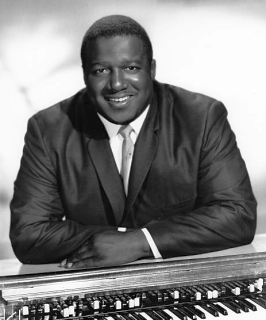
Richard Arnold "Groove" Holmes was an American jazz organist who performed in the hard bop and soul jazz genre. He is best known for his 1965 recording of "Misty".

Callen Radcliffe Tjader Jr. was an American Latin Jazz musician, often described as the most successful non-Latino Latin musician. He explored other jazz idioms, especially small group modern jazz, even as he continued to perform music of Africa, the Caribbean and Latin America.

Sir George Albert Shearing was a British jazz pianist who for many years led a popular jazz group that recorded for Discovery Records, MGM Records and Capitol Records. Shearing was the composer of over 300 songs, including the jazz standards "Lullaby of Birdland" and "Conception", and had multiple albums on the Billboard charts during the 1950s, 1960s, 1980s and 1990s.

Armando Peraza was a Cuban Latin jazz percussionist and a member of the rock band Santana. Peraza played congas, bongos, and timbales.
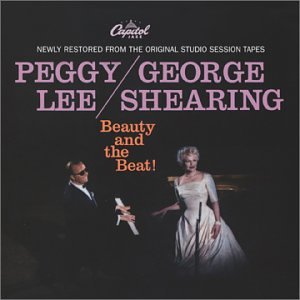
Beauty and the Beat! is a 1959 album by Peggy Lee, accompanied by the George Shearing Quintet.
"East of the Sun " is a popular song written by Brooks Bowman, an undergraduate member of Princeton University's Class of 1936, for the 1934 production of the Princeton Triangle Club's production of Stags at Bay. It was published in 1934 by Santly Bros. and soon became a hallmark of the Princeton Tigertones, Princeton University's signature all-male a cappella group. The Princeton Triangle Club performs the number every year at its annual Frosh Week show. The standard is also sung by the Princeton Nassoons.
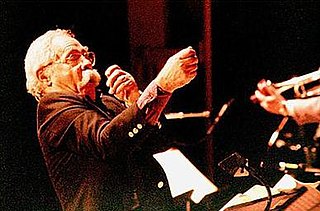
Manny Albam was an American jazz arranger, composer, record producer, saxophonist, and educator.
"September in the Rain" is a popular song about nostalgia by Harry Warren and Al Dubin, published in 1937. The song was introduced by James Melton in the film Melody for Two. It has become a standard, having been recorded by many artists since.

Dakota Staton was an American jazz vocalist who found international acclaim with the 1957 No. 4 hit "The Late, Late Show". She was also known by the Muslim name Aliyah Rabia for a period due to her conversion to Islam as interpreted by the Ahmadiyya Muslim Community.
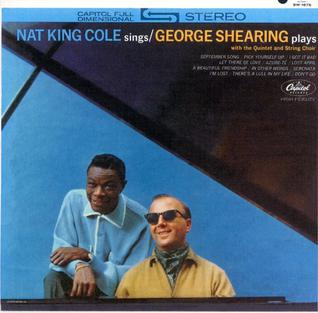
Nat King Cole Sings/George Shearing Plays is a 1962 studio album by Nat King Cole, featuring the pianist George Shearing. Containing new arrangements of two songs that Nat King Cole made famous in earlier versions: I'm Lost and Lost April. The album peaked at 27 on the Billboard album chart.

West Side Story is the soundtrack album to the 1961 film West Side Story, featuring music by Leonard Bernstein and lyrics by Stephen Sondheim. Released in 1961, the soundtrack spent 54 weeks at No. 1 on Billboard's stereo albums charts, giving it the longest run at No. 1 of any album in history, although some lists instead credit Michael Jackson's Thriller, on the grounds that this run for West Side Story was on a chart for stereo albums only at a time when many albums were recorded in mono. It did also spend 6 weeks at the top of the Billboard chart for mono albums. In 1962, it won a Grammy award for "Best Sound Track Album – Original Cast". In the United States, it was one of the best-selling albums of the 1960s, certifying three times platinum by the RIAA on November 21, 1986.
Royal Gordon "Rusty" Bryant was an American jazz tenor and alto saxophonist.
Groove Merchant was an American jazz and R&B record label during the 1970s. It was run by producer Sonny Lester and distributed by Pickwick Records. Notable artists included Chick Corea, O'Donel Levy, Buddy Rich, Jimmy McGriff, Lonnie Smith and Lionel Hampton. Lester would later close Groove Merchant and restructure it as Lester Radio Corporation, or LRC; TK Records were distributors for a period. Lester still retains the rights to the Groove Merchant/LRC back catalog and independently distributes them on compact disc.

The Swingin's Mutual! is an album by the George Shearing quintet, accompanied on the original 1961 release on six songs by the vocalist Nancy Wilson.
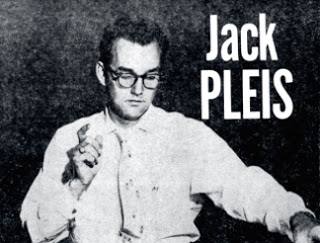
Jack K. Pleis was an American jazz pianist, arranger, conductor, composer and producer. He recorded on London and Decca Records in the 1950s, and Columbia Records in the 1960s. During the course of his career, Pleis worked with many artists, including Louis Armstrong, Harry Belafonte, Bing Crosby, Sammy Davis Jr., Benny Goodman, Earl Grant, Brenda Lee, and Joe Williams. Between 1950 and 1976, more than 150 songs were arranged by Pleis. His surname is pronounced "Pleece".

Ladies and Gentlemen... Mr. B.B. King is a box set compilation album by B. B. King. It traces King's career from his first singles for Bullet Records in 1949 to material on his last recorded album in 2008. Crowdfunded by Pledge Music in 2012, it was available in a full ten-disc box exclusive through Amazon.com, and a four-disc "highlights" box available everywhere else. People who pledged money also got a digital copy of the out-of-print 1975 album Lucille Talks Back. Both versions of the box are physically out of print; the four disc edition is bundled along with Lucille Talks Back digitally, although this version removes King's first single.
"Invitation" is a song by Bronisław Kaper with lyrics by Paul Francis Webster, which originally appeared in the film A Life of Her Own (1950). Although it was nominated for a Golden Globe award for Best Score in the original film, it only became a jazz standard after being used as the theme in the 1952 film Invitation. Tony Thomas notes that it was selected for the film for its degree of poignance. It is considered to be Kaper's second best known song after "On Green Dolphin Street". JazzStandards.com describes it as a "lush and haunting score" and notes that it is most associated with John Coltrane, who recorded it in 1958. Howard Morgen, who arranged it for guitar, writes that the "haunting" tune has "long been recognized by jazz players for its potential as an interesting mood piece" and "still sounds fresh and contemporary today."
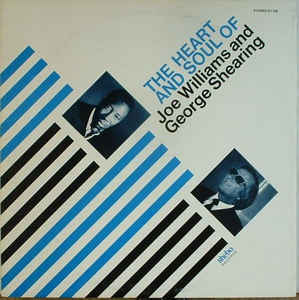
The Heart and Soul of Joe Williams and George Shearing is a 1971 album by jazz pianist George Shearing and singer Joe Williams. The album was released on Shearing's own record label, Sheba Records. All the songs on the album have the words "heart" or "soul" in their titles.

Latin Lace is a 1958 album by jazz pianist George Shearing and his quintet.

Madame Foo-Foo is an album by American jazz vocalist Dakota Staton recorded in 1972 and released on the Groove Merchant label.















